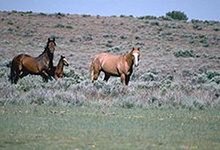Arizona congressman Raul Grijalva is lashing out against federal land managers’ emergency roundup of wild horses in northern Nevada, saying it poses a risk to the animals because it’s taking place during the height of foaling season.

Risk during foaling season
BLM helicopter roundup poses a risk to the wild horses because it's taking place during the height of foaling season.
Rep. Raul Grijalva said the operation in the Jackson Mountains northwest of Winnemucca involves the use of a helicopter to drive horses for miles to corrals in hot weather, and the Bureau of Land Management should have considered “less dangerous alternatives” to remove the animals from the range.
Grijalva, the ranking member of the House Subcommittee on National Parks, Forests and Public Lands, maintains the agency is conducting the roundup “under cover of an emergency,” but the situation facing horses around the Jackson Mountains does not meet the BLM’s own criteria for an emergency.
“June is the height of foaling season, meaning that BLM will be stampeding tiny foals, heavily pregnant mares and other horses that may already be compromised by lack of adequate water and forage,” Grijalva, D-Ariz., wrote in a letter sent Thursday to BLM Acting Director Mike Pool.
“Please be sure that I am watching this foaling season closely and hope to see BLM make a good faith effort to protect wild horse population health, as your own policies mandate.”
An agency spokeperson maintains that BLM policy is to not round up horses during foaling season, but a lack of forage because of the drought justifies their removal form the range a month early. Foaling season lasts from March 1 to June 30.
The agency plans to remove 630 of an estimated 930 horses in the Jackson Mountains Herd Management Area. Twenty-seven mustangs, including 15 mares and two foals, were removed during the first day of the operation Friday.
Eleven national horse advocacy organizations, including the Cloud Foundation and American Wild Horse Preservation Campaign, signed a letter asking the BLM to consider a “humane alternative” to the helicopter roundup.
Like Grijalva, they prefer “bait trapping,” which involves setting up panels and using food and water to lure mustangs into a trap.
“The BLM is using the drought as an excuse to clear out wild horses while risking their death,” said Anne Novak of Protect Mustangs. “They are leaving livestock on the same allegedly drought-afflicted land to graze, so BLM’s actions don’t make any sense.”
BLM's Worley said ranchers have voluntarily removed livestock from the hardest-hit area, and bait trapping has not been proven to be an effective method to gather large numbers of horses.
The agency is trying to avoid a repeat of 2007, when it lost 180 of about 900 mustangs it removed from the same area during similar drought conditions, Worley said.
“We waited too late (to begin the roundup) and are not going to take that chance again,” she said.
Nevada is home to about half of the estimated 37,000 wild horses on public lands in 10 western states.
